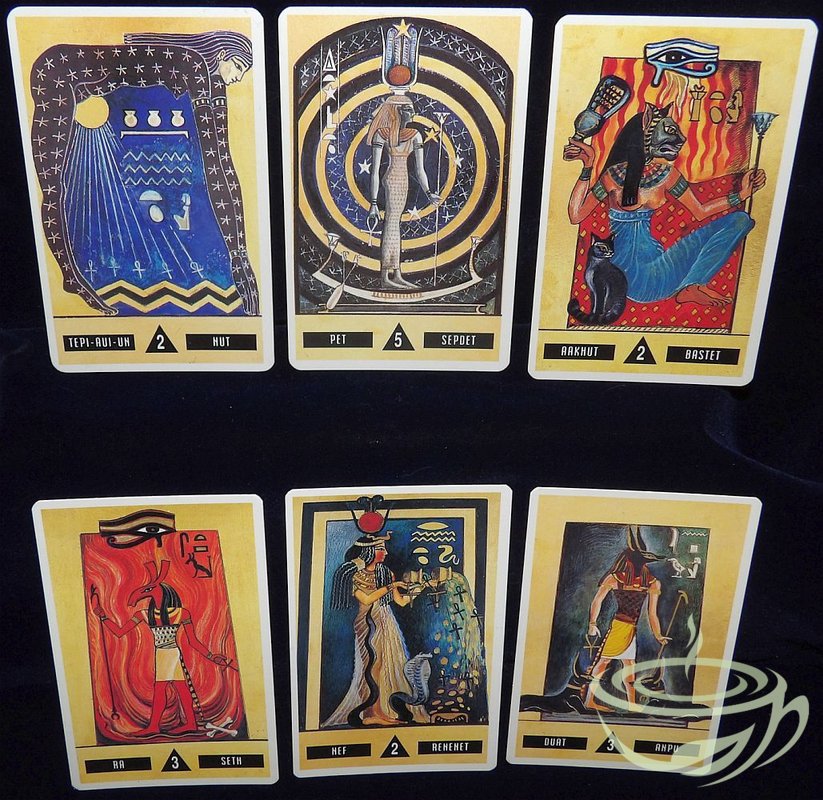Oops. I totally forgot to post yesterday. We had a divination party on Saturday, so was cleaning up and resting after that.
But in honor of that and in the spirit of the veil-thin-between-the-worlds season, I offer you an ancient method of divination that is specifically connected with our magical Lady Isis. It is (a bit) new in that it is a new translation of the ancient text in which the divination is found. The new translation doesn’t really change things much but it does, perhaps, give us a slightly better understanding of the original. And that’s always good.
The other new thing is that we can try it for ourselves.
This Isiac divination is found in the Greco-Egyptian Magical Papyri. You’ll usually see them just called the Greek Magical Papyri (Latin: Papyri Graecae Magicae, abbreviated PGM) because they are written in Greek, but the scholars who worked on them tell us that they reflect, in large part, Egyptian magical techniques, so I prefer Greco-Egyptian Magical Papyri. What’s more, we also have a cache of similar magical texts written in Demotic, which is a late, cursive version of the hieroglyphs. Demotic is derived from hieratic, which was an earlier, priestly version of cursive hieroglyphs. So those are unarguably Egyptian. Here’s some background on these fascinating texts.
The particular text I want to discuss is listed on the linked page above, but for easy reference, here it is again:
Great is the Lady Isis! Copy of a holy book found in the archives of Hermes: the method is that concerning the 29 letters through which letters Hermes and Isis, who was seeking Osiris, her brother and husband, found him. Call upon Helios and all the gods in the deep concerning those things for which you want to receive an omen. Take 29 leaves of a male date palm and write on each of the leaves the names of the gods. Pray and then pick them up two by two. Read the last remaining leaf and you will find your omen, how things are, and you will be answered clearly.
PGM XXIVa
This seems like a simple, easy, and fairly quick divination method.
It is likely that the 29 letters refer to the 29 letters of the Coptic alphabet. Coptic is the latest form of ancient Egyptian. The letters are adaptations of Greek, but with additional letters that incorporate Egyptian-language sounds that Greek didn’t have. It developed under the all-pervading influence of Hellenism in the Mediterranean region. Because the text instructs us to write the names of the Deities on the 29 palm leaves, I would assume that each of the Deity names written on the leaves had one of the Coptic letters as the initial letter of the name.
But that’s just a guess, not a certainty, and we simply have no other information. On the other hand, the Egyptians may have had tables of correspondences that connected the Deities to the Coptic alphabet like many modern magical systems do and which may or may not have been based on the spelling of the Deity name.
Oh, and just to be clear, this particular text WAS written originally in Greek, not Coptic or Demotic. But because the “29 letters” probably refers to the Coptic alphabet, we may understand this as likely to be a genuine Egyptian method of divination, but recorded in Greek.
Those of you who looked at the Coptic alphabet here may have noticed something: that it has more than 29 letters. (And, in fact, you will see some variations in the letters included, depending on dialect as well as the time period in which it was in use.)
That’s why I want to share with you a new translation of that same passage by David Jordan, head of the Canadian Archeological Institute in Athens, an Egyptologist and expert in the ancient magical texts. I won’t bore you with all the details, but it seems pretty reasonable to my definitely-not-an-expert self.
Great Isis the Lady. Copy of a sacred book found in the archives of Hermes. The method is the odd number of letters [i.e. 29; the number was actually a marginal note in the text rather than a number found inside the text itself], through which Hermes received omens and Isis, searching, found her own brother and husband Osiris. Say: ‘I invoke the sun and all the gods in the deep’—about whatever you wish to receive an omen. Taking 29 leaves of a male palm, write on each of the leaves (one of) the names of the gods and, when you have said a prayer, pick them up two by two. Read the last remaining leaf, and you will find wherein your omen consists, and you will receive an omen lucidly.
PGM XXIVa, revised translation
So you see, it’s not much different and certainly not in terms of how to actually do the divination. It’s just always interesting to me to see the graceful art of translation in action. The translator makes note that the initial phrase, “Great Isis the Lady,” appears in one other place that we know of: a graffito found in Rome. (There’s another well known Roman graffito related to Isis that I’ve written about before, which was found on one of the walls of the Temple of Isis in Rome. It says, Una, quae es omnia, Dea Isis, “Being one, You are all, Goddess Isis.”)
The fact that the phrase “Great Isis the Lady” was well known enough to be a graffito adds weight to Jordan’s translation. In this case, the phrase may be intended as the title of the divination method. It gains power and prestige from being the method the Great Magician Goddess Isis used to find Osiris and Thoth (Hermes) the Great Magician God used to receive omens.
So let’s give it a try.
Because I am sometimes lazy and didn’t have access to male palm leaves, I did it the cheap-and-easy way just to see how it worked on the quickie. It will definitely be worth following up on the more authentic track, too.
Instead of palm leaves with Deity names on them, I used 29 cards from an Egyptian-themed divination deck that I like. It’s called the Book of Doors. (If it appeals to you, you can get it from Inner Traditions or used on eBay.) It’s not a tarot deck with the traditional Arcana. Instead, it has an Egyptian Deity associated with each card and groups Them into families like Sun, Moon, Air, or Fire. The authors call it an “alchemical oracle.” I like the art.
Anyway, for this first attempt, I didn’t choose the 29 Deities based on Coptic alphabet initial letters, I just picked 29 of the most well known Goddesses and Gods, including Set and Apophis, because there have to be options in a divination.
First, we invoke…
We could follow the text and simply say, “I invoke Helios and all the gods of the deep about [stating the subject of the divination].” Or we could choose Egyptian names: “I invoke Re and the Primordial Ogdoad, the Great Infinities, about [stating the subject of the divination].” Or we could go All-Isis-All-the-Time: “I invoke Isis, the Radiant Goddess, Isis-Re-et, Great of Magic, in Her Name of Lady of the Depths about [stating the subject of the divination].” Take your pick.
Then we shuffle the 29 cards and spread them out, face down. In our hearts, we speak a prayer to Great Isis the Lady to reveal the true omen and send the Goddess, send the God Who will help us discover the answer. We pick up the cards, two by two, leaving them face down until there is only one left. That card, we turn over.
The question I asked was whether this divination method was truly an Isis divination. When revealed, the singleton card was Hathor. In this particular deck, Hathor is in the transformational family of Fire and She is shown emerging from the Otherworld.
How shall we interpret?
First reaction: Hathor is a strongly positive Goddess and, in this card, She is not in Her raging-Sakhmet aspect. If I had to give a quick yes/no answer, I’d definitely say yes, this IS a legit Isis divination. Or, since this card is part of a divination deck, we could use the interpretation provided by the authors. Their short-form answer for Hathor is “love, pleasure, beauty.” So again, I’d take that as a yes.
We could also go deeper into what we might know about Hathor Herself. She is a Great Goddess associated with the heavens, the earth, and the underworld. She is the all-containing sky Whose name means “House of Horus;” She is the greater sky in which He flies.
Because She is so all-containing, Hathor indicates that this is a divination method that contains all omens and is thus appropriate for receiving a wide range of Divine counsel. As a Lady of the earth, nature, and fertility, we may understand that the oracle can also provide earth-plane practical advice. Hathor is also a Goddess of the Otherworld and, in this card, is specifically shown emerging from it. Thus we can expect the emergence of revelations—as well as Mysteries—from this divination method.
If we choose, we could understand the divination on a more personal level, too. For instance, in another area of my magical life, I have a connection with Hathor, specifically with Her late-period form and Her Egyptian Coptic name of Ahathoor. So perhaps I could say that this could be a particularly good method of divination for me.
And, of course, Isis and Hathor were more and more closely connected as time time passed in Egyptian history; so much so that They shared many of each others’ epithets and symbols.
In sum, I’d say the answer to my question is definitely yes; this is a divination that could be very useful for those of us who honor Isis. Personally, I am looking forward to using it a lot more, learning more about it, and perhaps I can find some of those male palm leaves.
Here’s a great graphic showing how Demotic evolved from the hieroglyphs.











